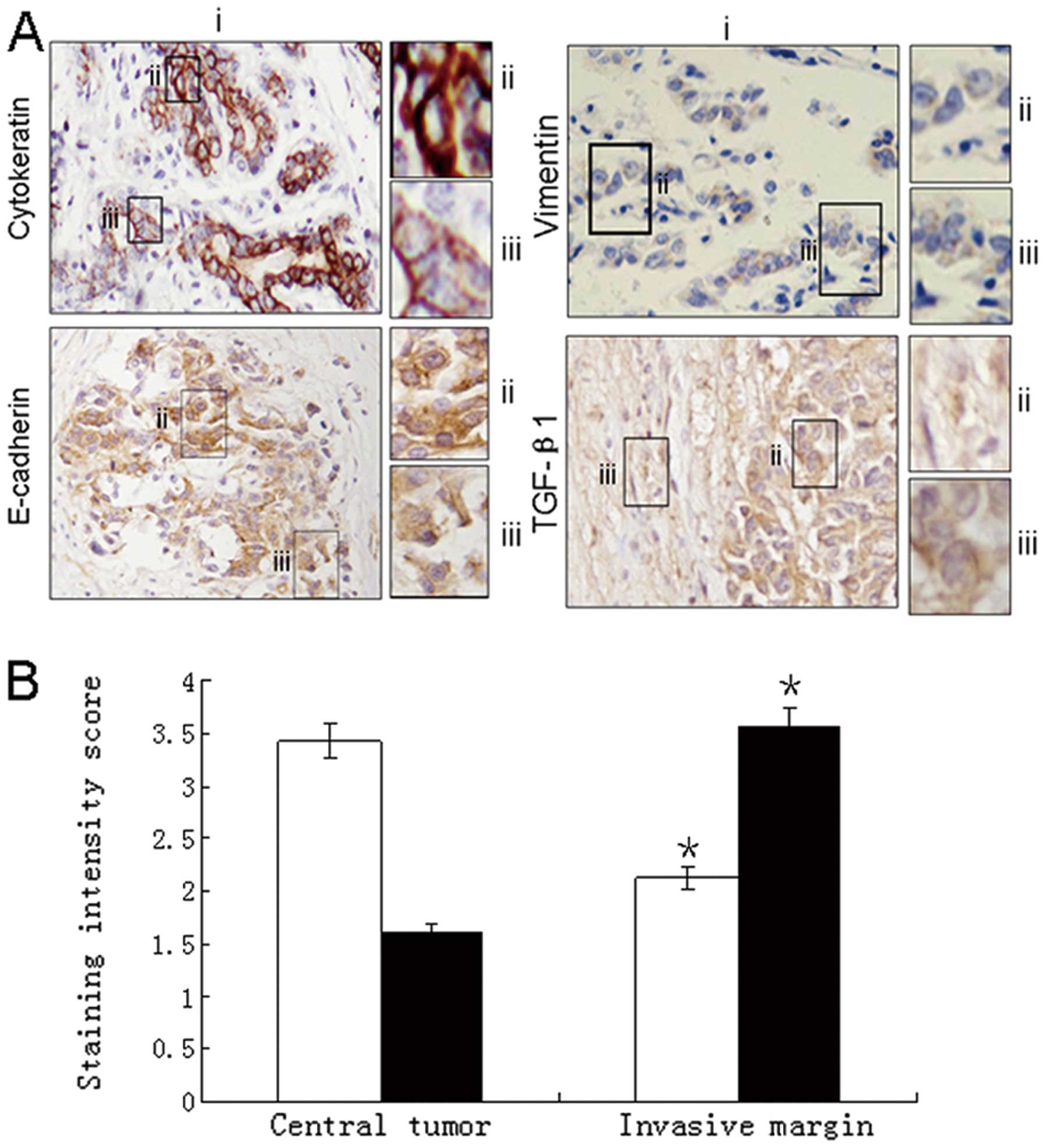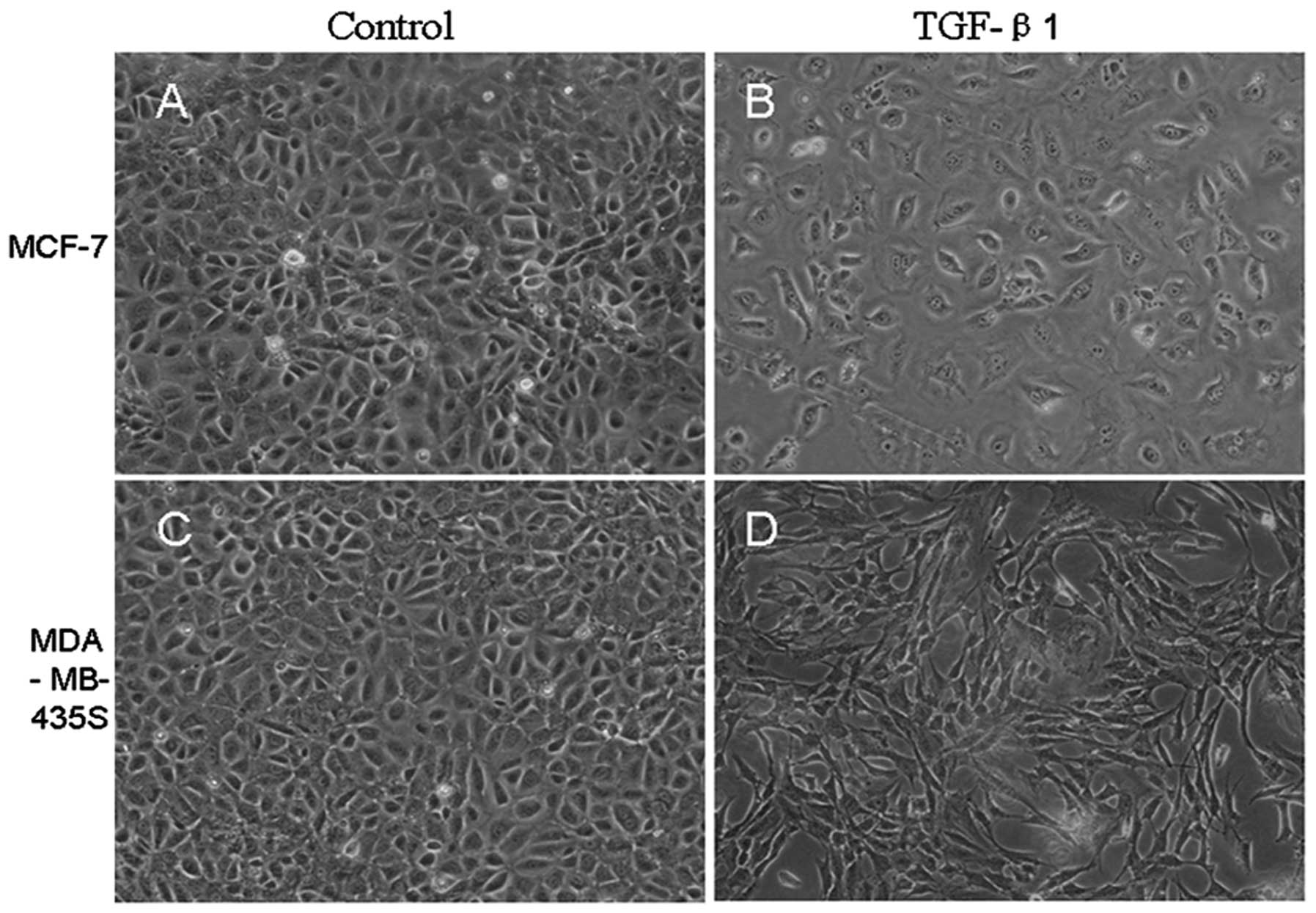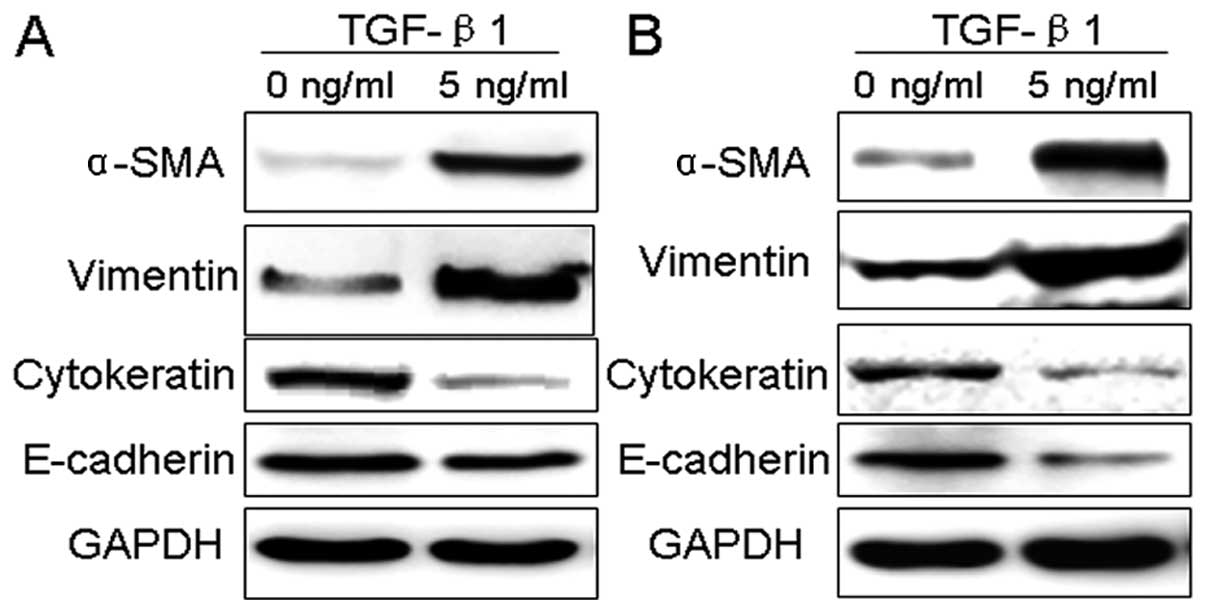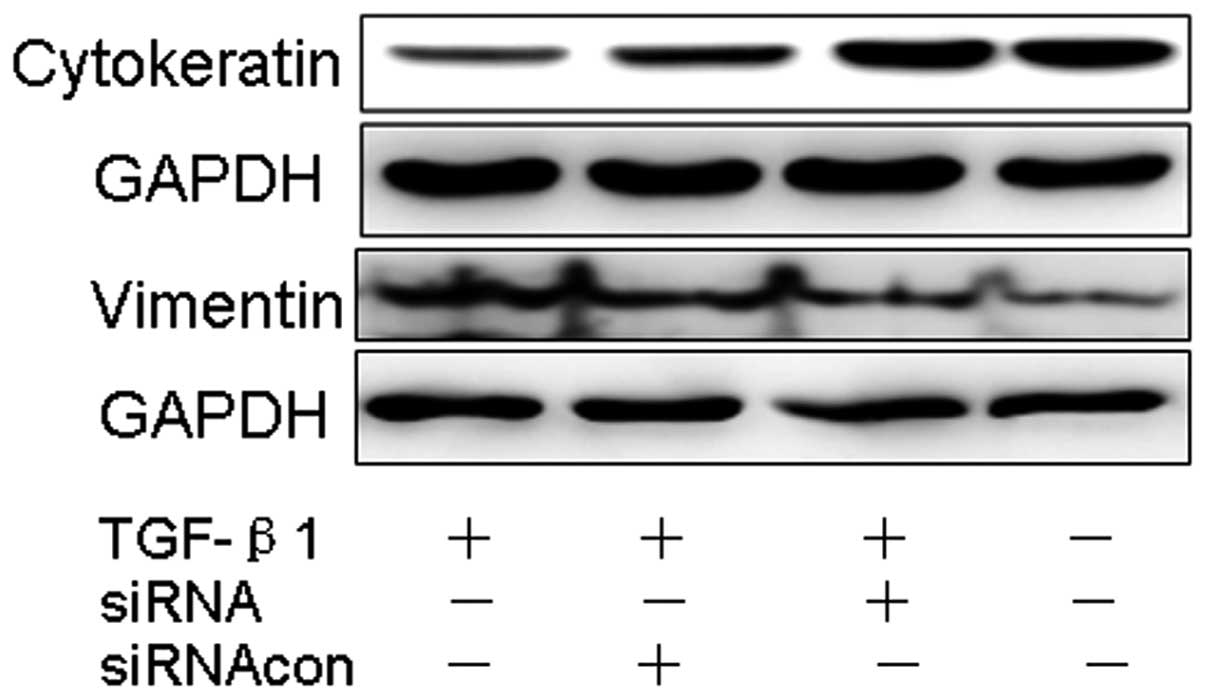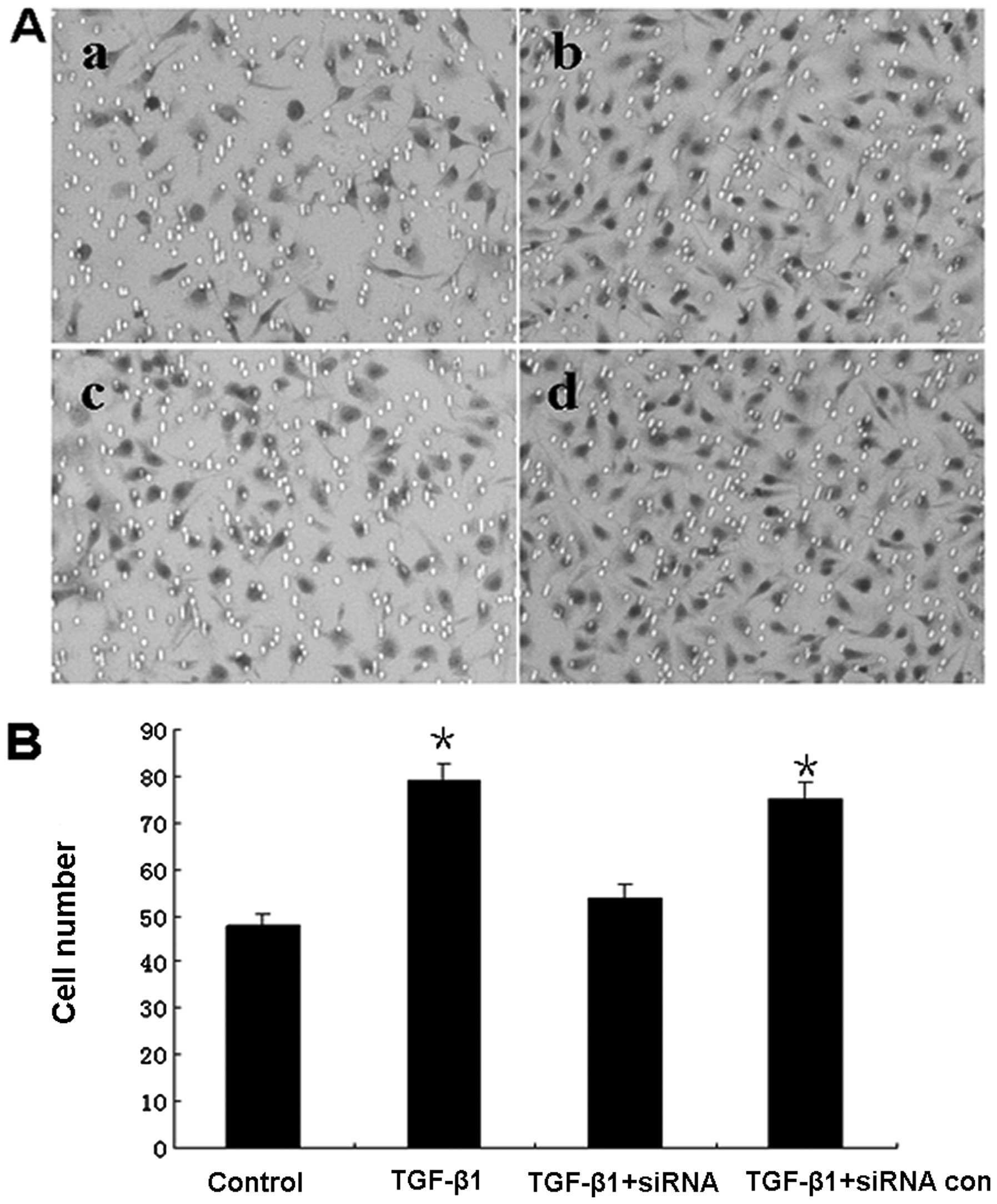|
1
|
Porter PL: Global trends in breast cancer
incidence and mortality. Salud Publica Mex. 51:141–146. 2009.
View Article : Google Scholar
|
|
2
|
Naber HP, Wiercinska E, Pardali E, van
Laar T, Nirmala E, Sundqvist A, van Dam H, van der Horst G, van der
Pluijm G, Heckmann B, Danen EH and Ten Dijke P: BMP-7 inhibits
TGF-β-induced invasion of breast cancer cells through inhibition of
integrin β(3) expression. Cell Oncol. 35:19–28. 2012.
|
|
3
|
Ding Z, Wu CJ, Chu GC, Xiao Y, Ho D, Zhang
J, Perry SR, Labrot ES, Wu X, Lis R, Hoshida Y, Hiller D, Hu B,
Jiang S, Zheng H, Stegh AH, Scott KL, Signoretti S, Bardeesy N,
Wang YA, Hill DE, Golub TR, Stampfer MJ, Wong WH, Loda M, Mucci L,
Chin L and DePinho RA: SMAD4-dependent barrier constrains prostate
cancer growth and metastatic progression. Nature. 470:269–273.
2011. View Article : Google Scholar : PubMed/NCBI
|
|
4
|
Gu Y, Mi W, Ge Y, Liu H, Fan Q, Han C,
Yang J, Han F, Lu X and Yu W: GlcNAcylation plays an essential role
in breast cancer metastasis. Cancer Res. 70:6344–6351. 2010.
View Article : Google Scholar : PubMed/NCBI
|
|
5
|
Polyak K and Weinberg RA: Transitions
between epithelial and mesenchymal states: malignant and stem
celltraits. Nat Rev Cancer. 9:265–273. 2009. View Article : Google Scholar : PubMed/NCBI
|
|
6
|
Greenburg G and Hay ED: Epithelia
suspended in collagen gels can lose polarity and express
characteristics of migrating mesenchymal cells. J Cell Biol.
95:333–339. 1982. View Article : Google Scholar : PubMed/NCBI
|
|
7
|
Lv ZD, Na D, Ma XY, Zhao C, Zhao WJ and Xu
HM: Human peritoneal mesothelial cell transformation into
myofbroblasts in response to TGF-β1 in vitro. Int J Mol Med.
27:187–193. 2011.PubMed/NCBI
|
|
8
|
Uchikado Y, Okumura H, Ishigami S,
Setoyama T, Matsumoto M, Owaki T, Kita Y and Natsugoe S: Increased
Slug and decreased E-cadherin expression is related to poor
prognosis in patients with gastric cancer. Gastric Cancer.
14:41–49. 2011. View Article : Google Scholar : PubMed/NCBI
|
|
9
|
Yanez-Mo M, Lara-Pezzi E, Selgas R,
Ramirez-Huesca M, Dominguez-Jimenez C, Jimenez Heffernan JA,
Aguilera A, Sanchez-Tomero JA, Bajo MA, Alvarez V, Castro MA, del
Peso G, Cirujeda A, Gamallo C, Sanchez-Madrid F and Lopez-Cabrera
M: Peritoneal dialysis and epithelial-to-mesenchymal transition of
mesothelial cells. N Engl J Med. 348:403–413. 2003. View Article : Google Scholar : PubMed/NCBI
|
|
10
|
Kang Y, Siegel PM, Shu W, Drobnjak M,
Kakonen SM, Cordón-Cardo C, Guise TA and Massagué J: A multigenic
program mediating breast cancer etastasis to bone. Cancer Cell.
3:537–549. 2003. View Article : Google Scholar : PubMed/NCBI
|
|
11
|
Katsuno Y, Hanyu A, Kanda H, Ishikawa Y,
Akiyama F, Iwase T, Ogata E, Ehata S, Miyazono K and Imamura T:
Bone morphogenetic protein signaling enhances invasion and bone
metastasis of breast cancer cells through Smad pathway. Oncogene.
7:6322–6333. 2008. View Article : Google Scholar : PubMed/NCBI
|
|
12
|
Padua D, Zhang XH, Wang Q, Nadal C, Gerald
WL, Gomis RR and Massagué J: TGFbeta primes breast tumors for lung
metastasis seeding through angiopoietin-like 4. Cell. 133:66–77.
2008. View Article : Google Scholar : PubMed/NCBI
|
|
13
|
Benson JR: Role of transforming growth
factor beta in breast carcinogenesis. Lancet Oncol. 5:229–239.
2004. View Article : Google Scholar : PubMed/NCBI
|
|
14
|
Xu J, Lamouille S and Derynck R:
TGF-beta-induced epithelial to mesenchymal transition. Cell Res.
19:156–172. 2009. View Article : Google Scholar : PubMed/NCBI
|
|
15
|
Shibata S, Marushima H, Asakura T,
Matsuura T, Eda H, Aoki K, Matsudaira H, Ueda K and Ohkawa K:
Three-dimensional culture using a radial flow bioreactor induces
matrix metalloprotease 7-mediated EMT-like process in tumor cells
via TGFβ1/ mad pathway. Int J Oncol. 34:1433–1448. 2009.PubMed/NCBI
|
|
16
|
Heldin CH, Miyazono K and ten Dijke P:
TGF-β signalling from cell membrane to nucleus through SMAD
proteins. Nature. 390:465–471. 1997.
|
|
17
|
Liu Q, Mao H, Nie J, Chen W, Yang Q, Dong
X and Yu X: Transforming growth factor beta1 induces
epithelial-mesenchymal transition by activating the JNK-Smad3
pathway in rat peritoneal mesothelial cells. Perit Dial Int.
3:88–95. 2008.PubMed/NCBI
|
|
18
|
Yoo YA, Kang MH, Kim BS, Kim JS and Seo
JH: Sustained co-cultivation with human placenta-derived MSCs
enhances ALK5/Smad3 signaling in human breast epithelial cells,
leading to EMT and differentiation. Differentiation. 77:450–461.
2009. View Article : Google Scholar : PubMed/NCBI
|
|
19
|
Albini A and Benelli R: The chemoinvasion
assay: a method to assess tumor and endothelial cell invasion and
its modulation. Nat Protoc. 2:504–511. 2007. View Article : Google Scholar : PubMed/NCBI
|
|
20
|
Wick MR and Swanson PE: Carcinosarcomas:
current perspectives and an historical review of nosological
concepts. Semin Diagn Pathol. 10:118–127. 1993.PubMed/NCBI
|
|
21
|
Thompson L, Chang B and Barsky SH:
Monoclonal origins of malignant mixed tumors (carcinosarcomas).
Evidence for a divergent histogenesis. Am J Surg Pathol.
20:277–285. 1996. View Article : Google Scholar : PubMed/NCBI
|
|
22
|
Brabletz T, Herrmann K, Jung A, Faller G
and Kirchner T: Expression of nuclear h-catenin and c-myc is
correlated with tumor size but not with proliferative activity of
colorectal adenomas. Am J Pathol. 156:865–870. 2000. View Article : Google Scholar : PubMed/NCBI
|
|
23
|
Giannelli G, Bergamini C, Fransvea E,
Sgarra C and Antonaci S: Laminin-5 with transforming growth
factor-β1 induces epithelial to mesenchymal transition in
hepatocellular carcinoma. Gastroenterology. 129:1375–1383.
2005.
|
|
24
|
Tojo M, Hamashima Y, Hanyu A, Kajimoto T,
Saitoh M, Miyazono K, Node M and Imamura T: The ALK-5 inhibitor
A-83-01 inhibits Smad signaling and epithelial-to-mesenchymal
transition by transforming growth factor-beta. Cancer Sci.
96:791–800. 2005. View Article : Google Scholar : PubMed/NCBI
|
|
25
|
Scheel C and Weinberg RA: Phenotypic
plasticity and epithelial-mesenchymal transitions in cancer and
normal stem cells? Int J Cancer. 129:2310–2314. 2011. View Article : Google Scholar : PubMed/NCBI
|
|
26
|
Jiang J, Tang YL and Liang XH: EMT: a new
vision of hypoxia promoting cancer progression. Cancer Biol Ther.
11:714–723. 2011. View Article : Google Scholar : PubMed/NCBI
|
|
27
|
Vered M, Dayan D, Yahalom R, Dobriyan A,
Barshack I, Bello IO, Kantola S and Salo T: Cancer-associated
fibroblasts and epithelial-mesenchymal transition in metastatic
oral tongue squamous cell carcinoma. Int J Cancer. 127:1356–1362.
2010. View Article : Google Scholar : PubMed/NCBI
|
|
28
|
Jin H, Morohashi S, Sato F, Kudo Y,
Akasaka H, Tsutsumi S, Ogasawara H, Miyamoto K, Wajima N, Kawasaki
H, Hakamada K and Kijima H: Vimentin expression of esophageal
squamous cell carcinoma and its aggressive potential for lymph node
metastasis. Biomed Res. 31:105–112. 2010. View Article : Google Scholar : PubMed/NCBI
|
|
29
|
ElMoneim HM and Zaghloul NM: Expression of
E-cadherin, N-cadherin and snail and their correlation with
clinicopathological variants: an immunohistochemical study of 132
invasive ductal breast carcinomas in Egypt. Clinics. 66:1765–1771.
2011.
|
|
30
|
Mimata A, Fukamachi H, Eishi Y and Yuasa
Y: Loss of E-cadherin in mouse gastric epithelial cells induces
signet ring-like cells, a possible precursor lesion of diffuse
gastriccancer. Cancer Sci. 102:942–950. 2011. View Article : Google Scholar : PubMed/NCBI
|
|
31
|
Gavert N and Ben-Ze’ev A:
Epithelial-mesenchymal transition and the invasive potential of
tumors. Trends Mol Med. 14:199–209. 2008. View Article : Google Scholar : PubMed/NCBI
|
|
32
|
Ge R, Rajeev V, Ray P, Lattime E, Rittling
S, Medicherla S, Protter A, Murphy A, Chakravarty J, Dugar S,
Schreiner G, Barnard N and Reiss M: Inhibition of growth and
metastasis of mouse mammary carcinoma by selective inhibitor of
transforming growth factor-beta type I receptor kinase in vivo.
Clin Cancer Res. 12:4315–4330. 2006. View Article : Google Scholar : PubMed/NCBI
|
|
33
|
Ansieau S, Caron de Fromentel C, Bastid J,
Morel AP and Puisieux A: Role of the epithelial-mesenchymal
transition during tumor progression. Bull Cancer. 97:7–15. 2010.(In
French).
|
|
34
|
Buck MB, Fritz P, Dippon J, Zugmaier G and
Knabbe C: Prognostic significance of transforming growth factor
beta receptor II in estrogen receptor-negative breast cancer
patients. Clin Cancer Res. 10:491–498. 2004. View Article : Google Scholar : PubMed/NCBI
|















